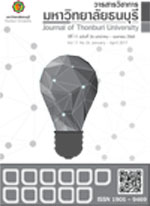ความสัมพันธ์ระหว่างบุคลิกภาพกับความรู้สึกอ่อนไหวต่อการแพร่ระบาดทางอารมณ์ของนักศึกษาระดับปริญญาตรี ในเขตกรุงเทพมหานคร
Keywords:
การแพร่ระบาดทางอารมณ์, ความอ่อนไหวต่อการแพร่ระบาดทางอารมณ์, Emotional Contagion, Susceptibility to Emotional ContagionAbstract
บทคัดย่อ
การวิจัยนี้มีวัตถุประสงค์ เพื่อศึกษาอิทธิพลขององค์ประกอบบุคลิกภาพด้านอุปนิสัย (Temperament) และคุณลักษณะ (character) ที่มีผลต่อความอ่อนไหวต่อการแพร่ระบาดทางอารมณ์ของนักศึกษาระดับปริญญาตรี ในเขตกรุงเทพมหานคร ตัวแปรอิสระ คือบุคลิกภาพ ตามกรอบแนวคิดของ Snvrakic ประกอบด้วยรูปแบบบุคลิกภาพ 5 ประการ ได้แก่ 1) การติดพึงใจในรางวัล 2) ความรู้สึกปีติ 3) การนำตนเอง 4) การให้ความร่วมมือ และ 5) การหลีกเลี่ยงภัยอันตราย ส่วนตัวแปรตาม คือ ความอ่อนไหวต่อการแพร่ระบาดทางอารมณ์ ประกอบด้วย ตัวแปรที่สังเกตได้ แบ่งเป็น อารมณ์เชิงบวก ได้แก่ อารมณ์สุข และอารมณ์รัก และอารมณ์เชิงลบ ได้แก่ อารมณ์โกรธ อารมณ์กลัว และอารมณ์เศร้า กลุ่มตัวอย่างเป็นนักศึกษาระดับปริญญาตรี ในเขตกรุงเทพมหานคร จำนวน 400 คน โดยวิธีการสุ่มแบบหลายขั้นตอน (Multi-stage Random Sampling) วิเคราะห์ข้อมูลโดยใช้โมเดลสมการโครงสร้าง ผลการวิจัยปรากฏว่า 1) โมเดลการวัดมีความสอดคล้องกลมกลืนกับข้อมูลเชิงประจักษ์เฉพาะบุคลิกภาพด้านการติดพึงใจในรางวัล (Reward Dependenc: RD) การนำตนเอง (Self – Directedness: SD) และการให้ความร่วมมือ (Cooperation: CO) 2) ความสอดคล้องโมเดลความสัมพันธ์เชิงสาเหตุบุคลิกภาพด้านการติดพึงใจในรางวัลที่ส่งผลต่อการแพร่ระบาดทางอารมณ์กับข้อมูลเชิงประจักษ์ แตกต่างจากสมมติฐานการวิจัยที่เสนอว่าบุคลิกภาพด้านการติดพึงใจในรางวัลมีอิทธิพลต่อความอ่อนไหวของทุกอารมณ์ 3) ความสอดคล้องโมเดลความสัมพันธ์เชิงสาเหตุบุคลิกภาพ ด้านการนำตนเองที่ส่งผลต่อการแพร่ระบาดทางอารมณ์กับข้อมูลเชิงประจักษ์ สอดคล้องกับสมมติฐานการวิจัยที่เสนอว่า บุคลิกภาพด้านการนำตนเอง มีอิทธิพลต่อความอ่อนไหวของอารมณ์สุข และอารมณ์รัก และ 4) ความสอดคล้องโมเดลความสัมพันธ์เชิงสาเหตุบุคลิกภาพ ด้านการให้ความร่วมมือที่ส่งผลต่อการแพร่ระบาดทางอารมณ์กับข้อมูลเชิงประจักษ์ สอดคล้องกับสมมติฐานการวิจัย ที่เสนอว่า บุคลิกภาพการให้ความร่วมมือ มีอิทธิพลต่อความอ่อนไหวของอารมณ์รัก และอารมณ์โกรธ
คำสำคัญ: การแพร่ระบาดทางอารมณ์, ความอ่อนไหวต่อการแพร่ระบาดทางอารมณ์
Abstract
The purpose of this research was to study the influence of the personality factors of temperament and character affected on the susceptibility to emotional contagion of undergraduate students in Bangkok, Thailand. The independent variables were 7 personalities: 1) Novelty Seeking 2) Harm avoidance 3) Reward dependence 4) Persistence 5) Self Directedness 6) Cooperativeness, and 7) Self transcendence. The dependent variable was the susceptibility to emotional contagion consisted of the positive emotion: happiness and love, and negative emotion: anger, fear and sadness. The sample derived by mean of multi-stage random sampling. Data were analyzed using causal modeling. Results indicated that: 1) The hypothetical model was consistent with the empirical data in the personality of Reward dependence, self direction (SD), and collaboration (CO)., 2) The personality of Reward dependence was inconsistent with the empirical data that differ from the theoretical hypothesis claimed that RD had some influences in all susceptibility of emotions., 3) The personality of self direction (SD) had some influences in the susceptibility of happiness and love that was consistent with the theoretical hypothesis., and 4) The personality of (Cooperation: CO) had some influences in the susceptibility of love and anger that was consistent with the theoretical hypothesis.
Keyword: Emotional Contagion, Susceptibility to Emotional ContagionReferences
นงลักษณ์ วิรัชชัย. (2538). โมเดลลิสเรล: สถิติวิเคราะห์สำหรับการวิจัย. พิมพ์ครั้งที่ 3. กรุงเทพฯ: ภาควิชาวิจัย การศึกษาคณะครุศาสตร์ จุฬาลงกรณ์มหาวิทยาลัย.
อรัญญา บุญธรรม. (2554). ทำอย่างไรเมื่อใจทุกข์. วารสารวิทยาลัยพยาบาลพระปกเกล้า, 22 (11), 91-93.
Cloninger, C. R., (1994). A Unified Biosocial Theory of Personality and its Role in the Development of Anxiety States. Psychiatric Development, 3, 167 – 226.
Cloninger, C. R., Svrakic, D. M., & Przybeck, T. R. (1993). A psychobiological model of temperament and character. Archives of General Psychiatry, 50(12), 975 – 990.
Cloninger, C. R., Przybeck, T. R., Svrakic, D. M., Wetzel, R. D. (1994). The Temperament and Character Inventory (TCI): a guide to its development and use. St. Louis, Missouri: Center for Psychobiology of Personality, Washington University.
Doherty, R. W. (1997). The Emotional Contagion Scale: A Measure of Individual Indifferences. Journal of Nonverbal Behavior, 21(2), 131 – 154.
Feldman, R. S. (2011). Understanding Psychology. 11th Ed. McGraw-Hill Education, 176-179.
Hatfield, E., Cacioppo, J. T., & Rapson, R. L. (1994). Emotional Contagion. New York, NY: Cambridge.
Hair,J. F., Black, W. C., Babom, B. J., & Anderson, R. E. (2010). Multivaitate data Analysis: Aglobal Perspective. 7th ed. Upper saddle PRiver, N.J.: Pearson Prentice Hall.
Jylha, P., & Isometsa, E. (2006).Temperament, Character and Symptoms of Anxiety and Depression in the general population, European Psychiatry, 21(6), 389 – 395.
Lundqvist, L. O. (2006). A Swedish Adaptation of the Emotional Contagion Scale: Factor Structure and Psychometric Properties. Scandinavian Journal of Psychology, 47, 263 – 272.
Maslow, A. (1954). Motivation and Personality. New York: Harper.
Svrakic, D. M., Przybeck, T. R., Whitehead, C., & Cloninger, C. R. (1999). Emotional Traits and Personality Dimensions.In C. R. Cloninger (Ed.), Personality and Psychopathology. Washington, DC: American Psychiatric Press. 245 – 265.







